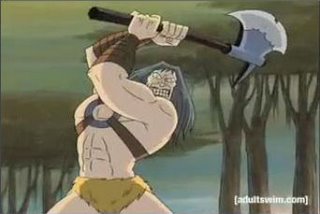
THE VENTURE BROTHERS & KORGOTH: TOOTHLESS SATIRE SAVES THE DAY
This blog of mine has not dealt very much with 'media criticism' as of yet, and it's time to change that. I just got TiVo a couple weeks ago, and it has given me an opportunity to catch up on my television. This is, I think, a very good thing. Television is a "most wondrous" thing, to warp a quote from Dewey. To try to explain (to myself and others) why I enjoy the shows I do presents a challenge to my writing ability.
Much of my television viewing time is spent watching old movies. TiVo picks these up like crazy, and I love them. But talking about how I use TiVo to record old movies is only slightly less irritating than hearing others (especially academics) explain how (or, even worse, why) they don't watch tv.
So, let me address two programs that I truly love: The Venture Brothers and Korgoth of Barbaria. Both are featured shows in the Cartoon Network's famed 'Adult Swim' showcase. Both are clearly geared toward male audiences. Both take a spoofy nonchalance in their tweaking of the formulaic pop culture of an earlier time. Venture Brothers is, quite clearly, an updated Johnny Quest. Korgoth of Barbaria is a Frank Frazetta painting, put into motion, with a lot of Mobius-inspired art thrown in for good measure. There is a familiar (boring?) postmodern twiddling of the knobs to be found here. The Venture Brothers involves a more blatantly sexual, more blatantly violent, more blatantly stupid version of Johnny Quest. Jokes move quickly as Dr. Venture and his two sons (Dean and Hank), with the help of their bodyguard (Brock Samson), face the dangers inherent in the life of a super-scientist. Korgoth involves somewhat less of an alteration of the subject, with storylines that actually could have come right from the pages of Heavy Metal, or from EC comics in the late 1950s.
The thing is this: why would anyone (myself included) enjoy a parody of Johnny Quest or of Heavy Metal magazine? Why so many belly-laughs from a satire of two pop culture phenomena that almost no one remembers anyway? I think it all has to do with the enjoyment we get out of fluency in cultural codes. This is nothing too complicated. Both shows (correctly or not) interpellate the viewer as someone who can speak the language of Johnny Quest and Heavy Metal. References to these minor cultural touchstones ooze out of every second of each show. From the clothes that Dean and Hank Venture wear, to the design of the jet they use to cruise from adventure to adventure, to art design, to the (Jim Thirwell-composed) music that scores the show, The Venture Brothers invites us to recognize the authors' (and our own) fluency in the cultural codes of 'adventure' cartoon of the 1960s. Korgoth is equally-studied in its particular references to Heavy Metal. Sunsets and sunrises are blood-red. Women are all ridiculously curvy and they do not speak. The battle axe is the weapon of choice. Magicians keep a tight grip over their castles. And so on. Korgoth's creators' attention to detail demands to be respected.
What are we to make of this? I don't think I've ever convinced anyone that either of these shows is funny. I don't think I'm every likely to. When popular culture involves this much reference to pre-existing codes, it's unlikely to get much more praise than a Quentin Tarantino movie. Still, it's fun to see the play in all these cliches, even if, before long, it all becomes more like a game of cards than the kind of trmendously meaningful experience someone like Adorno would have preferred. The utterly pre-fabricated has a spontaneousness all its own.
OH, AND SPEAKING OF ADORNO:
In the near future, along with two other bloggers, I will be writing on Adorno's Aesthetic Theory. That oughta be something. Stay tuned, web-slingers.
